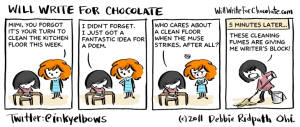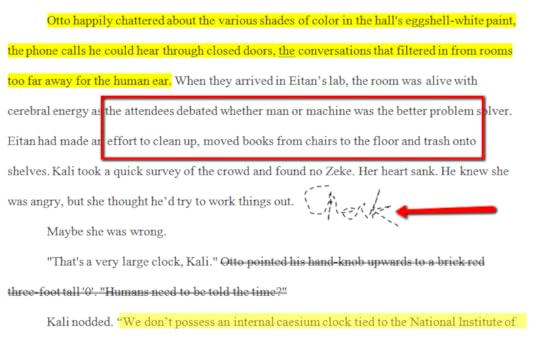Jacqui Murray's Blog, page 164
July 10, 2013
How do you get readers to trust you?
 I went to my bi-weekly writer’s critique group last night. We get submittals ahead of time, gather our thoughts and comments, and then each of us gets 5 minutes during the meeting to share our suggestions. This week, we were reviewing the work of one of my favorite group authors–we’ll call her Mari. She is writing an amazing piece about a family coping with Alzheimer’s. It’s character-driven fiction, but could also be classified as creative non-fiction so detailed and realistic are the scenes.
I went to my bi-weekly writer’s critique group last night. We get submittals ahead of time, gather our thoughts and comments, and then each of us gets 5 minutes during the meeting to share our suggestions. This week, we were reviewing the work of one of my favorite group authors–we’ll call her Mari. She is writing an amazing piece about a family coping with Alzheimer’s. It’s character-driven fiction, but could also be classified as creative non-fiction so detailed and realistic are the scenes.
The setting is a suburban town, a care facility for patients with Alzheimer’s. In one particular scene, a favorite parakeet of one of the residents escapes and a hawk swoops down and grabs it before anyone can return it to its cage. My comments focused on Mari’s ability to community the emotion experienced by all those involved. To my surprise, other group members shared their beliefs that this was impossible–a hawk wouldn’t be found in a suburban community (it was more detailed than that, but the gist of the objections were that this was not realistic).
Which got me thinking about the willing suspension of disbelief we all afford to fiction writers. Why had I accepted a hawk in a suburban neighborhood without questioning the veracity of that occurrence? It did sound odd on its face. In fact, I can’t remember the last time I saw a bird of prey swoop down on potential food in in a populated area. So why didn’t I–like my fellow group member–think Mari had pushed the envelope a bit too far.
The simple answer: I know Mari’s writing. She’s always detailed, accurate, well-researched in her plots and settings. As such, I love her submittals because I always learn from them.
The problem is: Few outside of our tight critique circle will know this about her. Many might react as this other woman did and reject the premise. So how do authors overcome that lack of intimacy?
I considered authors who often teach me through their writing–Stephen Hunter, Carsten Stroud, Michael Harvey, James Tabor, Ben Coes–and analyzed why I trusted them when I didn’t know them (well, Ben and I are Goodreads buddies. Yeah, we’re tight. OK, we belong to the same forum) and realized that they established their creds early and often in their writing. They often shared details that were both enlightening and believable, many times on subjects I had enough knowledge of to nod my head in agreement as I read the passage. They established themselves as an authority on the subjects they were writing about. Therefore, by the time I got to an off-the-wall scene–like hawks in a suburban area–I was inclined to trust the author and believe. It was that simple.
This is important. How many people do you talk to who list one of their first three reasons for reading as ‘to learn something’. That long list of readers includes me. I stop reading stories that don’t teach me–about life, emotions, facts, history, something. Educate me! But I don’t start out trusting an author. S/he must earn that trust by being right (almost) all the time. If s/he throws a fact out there I know is false, I’m jaded toward her/him. A second–I move on to someone new.
In Mari’s case, I’ve read her work for years. She’s accurate and I learn from her. So I trust her.
Here’s your takeaway: If you’re going to weave a plot piece into your story that strains credibility, set up your characters so readers will trust them (and you) and willingly suspend their disbelief. My fiction deals with the fascinating bits of science that few know but most would like to. Think: Jurassic Park. By the time the plot reached living 21st century dinosaurs, you were onboard, completely buying that stuff about DNA in amber (or whatever it was). How about Harry Potter’s invisibility cloak? I mean–why not?
How about you? How do you decide whether you trust an author or not?
Jacqui Murray is the author of the popular Building a Midshipman , the story of her daughter’s journey from high school to United States Naval Academy. She is webmaster for six blogs, an Amazon Vine Voice book reviewer, a weekly columnist for Examiner.com and TeachHUB, Editorial Review Board member for Journal for Computing Teachers, Cisco guest blog, IMS tech expert, and a monthly contributor to Today’s Author. In her free time, s he is the editor of a K-8 technology curriculum, K-8 keyboard curriculum, K-8 Digital Citizenship curriculum, and creator of technology training books for how to integrate technology in education. Currently, she’s editing a thriller that should be out to publishers next summer. Contact Jacqui at her writing office or her tech lab, Ask a Tech Teacher.
Filed under: writing Tagged: trust, writing


July 8, 2013
4 Tips for Writing Humor

Credit: Inky Girl (click for attribution)
I really struggled with this title. The post isn’t about writing comedy. That’s a useful genre, but one not particularly suited to novels. I think of comedy writers as working for the Letterman Show or a politician as a speech writer. Maybe a motivational speaker’s assistant.
You think those are odd choices? Not really. Humor makes people stop and pay attention. We always want to feel better about our world, our circumstances, ourselves, and humor does that. It can be outright jokes like these from my efriend Elizabeth over at Mirth and Motivation:
One day a Pastor and a Brother took a visitor fishing by boat. Once in the middle of the lake, the Pastor said, “I seem to have forgotten my fishing pole, be right back,” and to the visitor’s amazement, he stepped out of the boat and walked on top of the water towards the shore. When he returned, the Brother said, “I need to use the restroom, be right back!” Again, the visitor watched in amazement. Once the Brother returned, not wanting to be outdone, the visitor said “I need to use the restroom too.” As soon as he stepped out of the boat, he sank. The Pastor nudged the Brother and said “We should have told him where the rocks were.”
…or funny phrases thrown into the mix of life:
as slow as a tortoise on Valium
more characters than the Chinese alphabet
last thing I read was a utility bill
talking to her was like bringing home a carney
difference between ‘involvement’ and ‘commitment’ is like an eggs-and-ham breakfast: the chicken was ‘involved’ – the pig was ‘committed’
It helps us accept truths that we otherwise might reject:
his imitation of someone being reasonable
patience and I aren’t normally on speaking terms
common sense isn’t common
my real prospects were slim, none, and you’re kidding
It diffuses tense situations:
Those days I only knew six words if you count m***** f***** as two
I thought about saying, I shall return’, and decided it had been used before so settled for walking out without a word and not closing the door
maybe I should get an unlisted address
In short, as a writer, it keeps your readers entertained, turning pages, and in love with your characters (who doesn’t like the guy with the clever cracks). Here are a four hints from Writer’s Digest that resonated with me:
words with K and G are the funniest. Who knew? Odd though it may sound, start using names like Kristy and George, doing stuff that starts with K and G (klutzy, gyroscoping, conversational cul-de-sac)
establish a pattern and misdirect readers with the last one:
I wish you happiness, wealth, and that you can get the lid off the mayo jar the next time you make a sandwich.
comparisons:
like saying Noah was a shipbuilder
like the difference between being thrown from the 15th and 16th floor–they both kill you
as stupid as a chocolate teapot
reworking an old cliche–start with the standard, but change the ending
A bird in hand is in danger of being crushed
You might have nine lives, but you’ve been going through them like a chain smoker
What are your tips for writing humor? Do you think it’s important in novels? Do you like stories better that include a light side?
More on humor:
Humorous and Inspiration Quotes–Part II
Inspirational and Humorous Quotes–Part I
How to be Funny if You’re Not–II
How to be Funny if You’re Not–Part I

PS–I had to throw in this video. Y’all know the Periodic Table? That’s for science scholars, right? Who would be able to–much less want to–remember every element it contained? These geeky guys. They even wrote a song about it:
Jacqui Murray is the author of the popular Building a Midshipman , the story of her daughter’s journey from high school to United States Naval Academy. She is webmaster for six blogs, an Amazon Vine Voice book reviewer, a weekly columnist for Examiner.com and TeachHUB, Editorial Review Board member for Journal for Computing Teachers, Cisco guest blog, IMS tech expert, and a monthly contributor to Today’s Author. In her free time, s he is the editor of a K-8 technology curriculum, K-8 keyboard curriculum, K-8 Digital Citizenship curriculum, and creator of technology training books for how to integrate technology in education. Currently, she’s editing a thriller that should be out to publishers next summer. Contact Jacqui at her writing office or her tech lab, Ask a Tech Teacher.
Filed under: humor, writers tips Tagged: humor, writing tips


July 5, 2013
Book Review: Homecoming
My rating: 5 of 5 stars
Carsten Stroud’s The Homecoming (Knopf 2013) is the second in the Niceville trilogy. It picks up where Niceville left off, with our hero Nick Kavanaugh, called in when a flock of crows brings down a private jet of Chinese nationals by mucking up their engines. Nick is already knee deep in a dozen other police problems (many carried over from the first novel), including the disappearance of his father-in-law, several mysterious deaths, and a bank robbery no one can solve. To add to the confusion, his wife Kate is guardian for a ten-year-old orphaned boy who comes to live with them–and brings with him a whole new set of ghosts, voices, and personal agendas. As Nick wades through the clues, the only thread he can find to explain everything that has happened is supernatural forces preying on his quiet sun-dappled community.
Let me stop here: I don’t ordinarily go for paranormal, and before Niceville, Carsten Stroud didn’t write that type of book. I got interested in Stroud through his military novels--Cuba Strait and Cobraville–so was excited to find a new novel by him. He didn’t so much change genres as create a new sub-category of ‘paranormal thriller’. If I were interested in that genre, there’s no one better to write it than Stroud. He has a light-hearted approach (“Speaking of painful, he was aware of Deitz looming at his shoulder, smelling lemony fresh” and “In short, from the ground up, he looked pretty damn good, like a designer refrigerator or like one of those retired NFL linebackers who get jobs as halftime commentators on Fox and CBS–hyper-snazzy in a vaguely alarming way”), a down-to-earth believability even of the unbelievable. Plus–and this may be the most important element–the ghosts and goblins in no way rule the plot; there are lots of ‘regular’ thriller/mystery pieces to keep the story moving along the traditional genre tracks. In his competent hands, this blending of two genres works. Consider this quote at the beginning of the novel:
“Among the dead, there are those who still have to be killed.”
Who could not keep reading after that?
The setting is the southern town of Niceville, a slow-moving, friendly place where most people know most everyone. Stroud recreates this tight, got-your-back community expertly with dialogue, descriptive detail, and chapter titles like ‘Zero to Sixty in Four Point Three is Good but Sixty to Zero in One is Not’. Every character Stroud introduces fits perfectly, and there are many. If you didn’t meet them in the first book, you might feel overwhelmed by the volume of people it takes to move this plot along. If you read Niceville first, you’ll be OK. In fact, Stroud often refers to events covered in the first book. Yes, he tries to explain them, but it’s a complicated plot with lots of twists and turns and murders and oddities. Consider:
“Plus remember that guy, the guy who found out Twyla’s dad was taking pictures of her in the shower, got ahold of them and emailed them to Twyla?”
Yeah, I do, from the first book. There’s a lot of backstory that adds a ton of color to the story. If all you get is that one sentence, you might be left shaking your head.
Don’t let my whining discourage you from buying this book. Stroud is a top notch story teller. I’ll be reading Part III.
Jacqui Murray is the author of the popular Building a Midshipman , the story of her daughter’s journey from high school to United States Naval Academy. She is webmaster for six blogs, an Amazon Vine Voice book reviewer, a columnist for Examiner.com and TeachHUB, Editorial Review Board member for Journal for Computing Teachers, Cisco guest blog, Technology in Education featured blogger, IMS tech expert, and a bi-monthly contributor to Today’s Author. In her free time, s he is the editor of a K-8 technology curriculum, K-8 keyboard curriculum, K-8 Digital Citizenship curriculum, and creator of technology training books for how to integrate technology in education. Currently, she’s editing a thriller that should be out to publishers next summer. Contact Jacqui at her writing office or her tech lab, Ask a Tech Teacher.
Filed under: book reviews Tagged: book review, fantasy, paranormal


July 4, 2013
Happy July Fourth. Pass Me the Scissors

This will take forever
This is the perfect day to write. Kids are grown up–one’s in DC celebrating with friends, the other’s an Army boy in Kuwait with the Signal Corps. Holidays aren’t the same when kids aren’t the engine that drives them. Today, my husband and I are relaxing, bbqing steaks when it cools off and watching a TVo’d show before going to bed.
Me, I’m also editing my mss. I have about a month this summer to complete it or I probably never will. As a teacher, my only big block of open time is summer. I thought I’d finish last summer, but didn’t even get close. I’m committed this time. Today and the next 45 days, I’m wordsmithing, cutting out unnecessary descriptions, actions, redundancies–all that stuff that slows a novel down and makes you want to skip pages. Who was it said, Cut out the stuff that readers skip. That’s what I’m doing.
It’s July 4th and I’m at 108,398 words. I need to get to 100,000. I’ll keep you up to date.
While I’m working, here are some videos to remind us-all of that amazing day 237 years ago and the bravery of our forebears. God be with all of you.
Jacqui Murray is the author of the popular Building a Midshipman , the story of her daughter’s journey from high school to United States Naval Academy. She is webmaster for six blogs, an Amazon Vine Voice book reviewer, a columnist for Examiner.com and TeachHUB, Editorial Review Board member for Journal for Computing Teachers, Cisco guest blog, Technology in Education featured blogger, IMS tech expert, and a bi-monthly contributor to Today’s Author. In her free time, s he is the editor of a K-8 technology curriculum, K-8 keyboard curriculum, K-8 Digital Citizenship curriculum, and creator of technology training books for how to integrate technology in education. Currently, she’s editing a thriller that should be out to publishers next summer. Contact Jacqui at her writing office or her tech lab, Ask a Tech Teacher.
Filed under: I love the USA, writing Tagged: edit, holiday, july 4th, novel writing


July 3, 2013
Check Out My Today’s Author Post
I invite you to drop by my article over at Today’s Author, on Body Language and Lies. If you can’t make it, no worries. I’ll post here here soon.

Jacqui Murray is the author of the popular Building a Midshipman , the story of her daughter’s journey from high school to United States Naval Academy. She is webmaster for six blogs, an Amazon Vine Voice book reviewer, a columnist for Examiner.com and TeachHUB, Editorial Review Board member for Journal for Computing Teachers, Cisco guest blog,Technology in Education featured blogger, IMS tech expert, and a bi-weekly contributor to Today’s Author. In her free time, s he is the editor of a K-8 technology curriculum, K-8 keyboard curriculum, K-8 Digital Citizenship curriculum, and creator of technology training books for how to integrate technology in education. Currently, she’s editing a thriller that should be out to publishers next summer. Contact Jacqui at her writing office or her tech lab, Ask a Tech Teacher.
Filed under: Guest bloggers Tagged: guest post, writing


July 2, 2013
Tech Tip for Writers #56: Force a New Page
 Tech Tips for Writers is an (almost) weekly post on overcoming Tech Dread. I’ll cover issues that friends, both real-time and virtual, have shared. Feel free to post a comment about a question you have. I’ll cover it in a future Tip.
Tech Tips for Writers is an (almost) weekly post on overcoming Tech Dread. I’ll cover issues that friends, both real-time and virtual, have shared. Feel free to post a comment about a question you have. I’ll cover it in a future Tip.
Q: I’m teaching my students to create a book report with a cover page. what’s the easiest way to get the cover on the first page and the report on the second?
A: Students as young as 2nd grade can learn to force a new page with Ctrl enter. I have them create the cover page during one class and add the Ctrl enter for the new page. That way, students can type the book report without me to help–even on the classroom computers.
For writers, it’s a quick way to move to a new chapter–faster than the menu commands. Umm, please tell me you don’t push ‘enter-enter…’ to reach a new page.
To sign up for Tech Tips delivered to your email, click here.
___________________________________________________________________________________________
Jacqui Murray is the author of the popular Building a Midshipman , the story of her daughter’s journey from high school to United States Naval Academy. She is webmaster for six blogs, an Amazon Vine Voice book reviewer, a weekly columnist for Examiner.com and TeachHUB, Editorial Review Board member for Journal for Computing Teachers, Cisco guest blog, IMS tech expert, and a monthly contributor to Today’s Author. In her free time, s he is the editor of a K-8 technology curriculum, K-8 keyboard curriculum, K-8 Digital Citizenship curriculum, and creator of technology training books for how to integrate technology in education. Currently, she’s editing a thriller that should be out to publishers next summer. Contact Jacqui at her writing office or her tech lab, Ask a Tech Teacher.
Filed under: tech tips for writers Tagged: tech tips, Word, writers tips


July 1, 2013
7 Tips for Literary Fiction Writers
 Every genre is different when you’re an author. Romance stories don’t follow the same rules as mysteries, or westerns. I didn’t know that for a long time. Sure, I knew each genre had a favored word count, from 45,000 for YA (at the low end) to 120,000 for thrillers. But I didn’t know there was so much difference in voice, pacing, plotting–well, every element that makes a great story.
Every genre is different when you’re an author. Romance stories don’t follow the same rules as mysteries, or westerns. I didn’t know that for a long time. Sure, I knew each genre had a favored word count, from 45,000 for YA (at the low end) to 120,000 for thrillers. But I didn’t know there was so much difference in voice, pacing, plotting–well, every element that makes a great story.
Over the next few weeks, I’m going to share with you what the best in each genre consider critical to penning a blockbuster. I’ll start with Literary Fiction because that is the most popular (with thrillers a near second). Literary Fiction includes novels such as The Great Gatsby, To Kill a Mockingbird, Life of Pi, The Handmade’s Tale. They’re books that you savor, take weeks to read, and mull over with friends while eating leisurely dinners in five-star restaurants. Here are seven organic bits of advice from Writers Digest, Absolute Write, and others that you need to embrace if you’re a Lit Fic writer:
aim for transcendency–make your story bigger than the plot. It’s about ideas, not action. If you see yourself as that writer hunched over his/her computer, thinking deep thoughts that explain why characters do this or that, you have a LitFic soul. If you’re a James Bond fan, well, there’s always the possibility of a new genre–the LitFic thriller.
develop characters well–LitFic is more likely character-driven than other genres. Make your characters interesting, unusual, appealing, vulnerable, relatable. Spend time on them. Have them reflect on circumstances, share with readers what makes them do whatever they do. Internal monologues are common and critical in LitFic.
theme is as important as plot. What is your theme? Good vs. evil? Individual vs. Big Government? Human forgiveness? Whatever it is, develop it well with setting, dialogue, characters, and all other story pieces. Make it central to your novel.
share opinions, but don’t get preachy. LitFic is more likely to have complicated ideas that are thoroughly discussed throughout the plot. Don’t be afraid to state your thoughts, but do give all sides to the idea. Otherwise, you’ll appeal only to the choir, not the Renaissance readers who favor Literary Fiction novels.
understand that LitFic is as much about producing a tome that is cerebrally beautiful as popular. Embrace that. Don’t worry if it takes you a while to get that concept down on paper. Expect it to. You’ll know when you’ve finished.
expect your writing to be described as ‘elegant’, ‘lyrical’, ‘thought-provoking’, or ‘high-brow’. If it is, and you like that, you are probably a literary fiction writer.
take time in the plot to thoroughly explore characters, ideas, motivation, feelings. That means, your plot will be slower than other genres. Accept that. It’s a good thing if this is your genre.
Do these sound like you? If not, keep reading my blog as I spotlight other options for the writer in you. The genre you select is critical. It must fit your voice, your personality, your reasons for putting keyboard to doc. Otherwise you risk getting an Amazon review like my efriend Kort Kramer recently wrote in a Vine review: “…I couldn’t help but think, ‘The covers of this book are too far apart.’”
This is the first in a Monday series of tips that are genre-specific.
Jacqui Murray is the author of the popular Building a Midshipman , the story of her daughter’s journey from high school to United States Naval Academy. She is webmaster for six blogs, an Amazon Vine Voice book reviewer, a weekly columnist for Examiner.com and TeachHUB, Editorial Review Board member for Journal for Computing Teachers, Cisco guest blog, IMS tech expert, and a monthly contributor to Today’s Author. In her free time, she is editor of a K-8 technology curriculum, K-8 keyboard curriculum, K-8 Digital Citizenship curriculum, and creator of technology training books for how to integrate technology in education. Currently, she’s editing a thriller that should be out to publishers next summer. Contact Jacqui at her writing office or her tech lab, Ask a Tech Teacher.
Filed under: writers tips Tagged: literary fiction, writers tips


June 28, 2013
Book Review: The Leveling
by Dan Mayland
My rating: 5 of 5 stars
Dan Mayland’s sequel to The Colonel’s Mistake, The Leveling ( Thomas & Mercer 2013) is a worthy follow-up. The plot follow a favorite thread of mine–spy/agent/SEAL struggles to start over as a professor/shop keeper/loving mate, only to be wrenched back into the treachery of his former life by forces beyond his control. In this case Mark Sava is a CIA agent-turned-professor living in the questionable city of Baku, Azerbaijan. He thinks he’s done it–remade himself complete with serious girlfriend ignorant of his past, non-CIA friends, and memories that don’t include blood and butchery.
Until fate intervenes and he is thrown out of his adopted country about the same time John Decker, a friend from his spy days, goes missing, presumably kidnapped. No one is trying to find Decker so Sava teams up with another ex-CIA operative to find him.
The plot isn’t terribly original. What makes this a five-star read is how Mayland writes–the plot twists, character development, and setting knowledge that no one short of a man who’s lived that part of the world in too-close relief would know. Tell me that you don’t see exactly what Mayland wants you to with this perfect collection of words:
“Beyond the windows, daily life in the city of Baku played like a silent film [through soundproof windows]. A dirty minibus belching diesel fumes and packed with people lurched by. An old man in a three-piece suit slowly painted the trunk of a sidewalk tree white. A lady in high heels and a miniskirt chatted on a cell phone while a withered Gypsy woman in bright clothes swept the street.”
What a masterful job of building Mark Sava’s character–caring, intelligent, ex-CIA so notices everything, empathetic for the world he inhabits. Or how about this:
He thought about how Buddhist monks would spend days constructing an intricate sand painting, only to destroy it right after they’d finished. The exercise allegedly helped them embrace impermanence. Which was exactly what he needed to do.
This description shows up on page 51. Tell me you can resist a character who knows how Buddhist monks train?
One detractor: Lots of flashbacks, early in the book. Mayland makes them work because they aren’t narrative and reflective. They’re action-packed and pithy. I can handle that.
Overall, if you’re crunched for time over the summer, this is not the book you want to skip.
Jacqui Murray is the author of the popular Building a Midshipman , the story of her daughter’s journey from high school to United States Naval Academy. She is webmaster for six blogs, an Amazon Vine Voice book reviewer, a weekly columnist for Examiner.com and TeachHUB, Editorial Review Board member for Journal for Computing Teachers, Cisco guest blog, IMS tech expert, and a monthly contributor to Today’s Author. In her free time, she is editor of a K-8 technology curriculum, K-8 keyboard curriculum, K-8 Digital Citizenship curriculum, and creator of technology training books for how to integrate technology in education. Currently, she’s editing a thriller that should be out to publishers next summer. Contact Jacqui at her writing office or her tech lab, Ask a Tech Teacher.
Filed under: book reviews Tagged: book review


June 27, 2013
My Character is Sick–How to Show (Not Tell) Illness

Your character’s sick. Make the reader feel it.
Fiction writing is about communicating as much as possible within the story line. Every writing class you take will exhort you to show not tell. As Samuel Clemens said,
“Don’t tell us that the old lady screamed.
Bring her on and let her scream.”
You will often have your characters become sick in the novel. It creates drama. It helps the reader feel empathy for the protagonist or enmity for the antagonist. Maybe it serves the plot line. Here are some ideas you can use if your character is sick:
Dehydration
Dark urine with a very strong odor.
Low urine output.
Dark, sunken eyes.
Fatigue.
Emotional instability.
Loss of skin elasticity.
Delayed capillary refill in fingernail beds.
Trench line down center of tongue.
Thirst. Last on the list because you are already 2 percent dehydrated by the time you crave fluids.
Scorpion Stings
Scorpions are all poisonous to a greater or lesser degree. There are two different reactions, depending on the species:

Photo credit: Grovlam
Severe local reaction only, with pain and swelling around the area of the sting. Possible prickly sensation around the mouth and a thick-feeling tongue.
Severe systemic reaction, with little or no visible local reaction includes respiratory difficulties, thick-feeling tongue, body spasms, drooling, gastric distention, double vision, blindness, involuntary rapid movement of the eyeballs, involuntary urination and defecation, and heart failure. Death is rare, occurring mainly in children and adults with high blood pressure or illnesses.
Treat scorpion stings as you would a black widow bite.
Snakebites
Deaths from snakebites are rare. Snake venoms not only contain poisons that attack the victim’s central nervous system (neurotoxins) and blood circulation (hemotoxins), but also digestive enzymes (cytotoxins) to aid in digesting their prey. These poisons can cause a very large area of tissue death, leaving a large open wound. This condition could lead to the need for eventual amputation if not treated.
Bites from a nonpoisonous snake will show rows of teeth. Bites from a poisonous snake may have rows of teeth showing, but will have one or more distinctive puncture marks caused by fang penetration. Symptoms may be bleeding from the nose and anus, blood in the urine, pain at the site of the bite, and swelling at the site of the bite within a few minutes or up to 2 hours later.
Breathing difficulty, paralysis, weakness, twitching, and numbness are also signs of neurotoxic venoms. These signs usually appear 1.5 to 2 hours after the bite.
Stings

See the image at the right for an image. After your character is stung, be sure to follow these instructions to relieve the itching and discomfort:
Cold compresses.
A cooling paste of mud and ashes.
Sap from dandelions.
Coconut meat.
Crushed cloves of garlic.
Onion.
Spider Bites
The black widow spider is identified by a red hourglass on its abdomen. The initial pain is not severe, but severe local pain rapidly develops. The pain gradually spreads over the entire body and settles in the abdomen and legs. Abdominal cramps and progressive nausea, vomiting, and a rash may occur. Weakness, tremors, sweating, and salivation may occur. Anaphylactic reactions can occur. Symptoms begin to regress after several hours and are usually gone in a few days.
The brown recluse spider is a small, light brown spider identified by a dark brown violin on its back. There is no pain, or so little pain, that usually a victim is not aware of the bite. Within a few hours a painful red area with a mottled cyanotic center appears. Necrosis does not occur in all bites, but usually in 3 to 4 days, a star-shaped, firm area of deep purple discoloration appears at the bite site. The area turns dark and mummified in a week or two. The margins separate and the scab falls off, leaving an open ulcer. Secondary infection and regional swollen lymph glands usually become visible at this stage. The outstanding characteristic of the brown recluse bite is an ulcer that does not heal but persists for weeks or months. In addition to the ulcer, there is often a systemic reaction that is serious and may lead to death. Reactions (fever, chills, joint pain, vomiting, and a generalized rash) occur chiefly in children or debilitated persons.
Tarantulas are large, hairy spiders found mainly in the tropics. Most do not inject venom, but some South American species do. If bitten, pain and bleeding are certain, and infection is likely. Treat a tarantula bite as for any open wound, and try to prevent infection. If symptoms of poisoning appear, treat as for the bite of the black widow spider.
I know. Not a lot, but these are the only illnesses my characters have come across in my novels so far. Would you share yours so we-all can develop a database?
For more descriptors for characters and settings, click here.
Filed under: characters, descriptors, research, teacher resources, writers, writers resources Tagged: character traits, descriptors, illnesses, writers resources, writers toolkit, writers tools


June 26, 2013
Beautiful Words

Beautiful words
What makes you want to remember a word like cornucopia, abecederian, heterodoxy, circumlocution when you read it? ? Do you try to decode it first–Is ‘-locution’ the root? and what’s the prefix–’hetero-’ tell you about the meaning? What about the suffix -ian–does that make it a noun?
Here’s a great word that roles off your tongue–contradistinction. Think root and prefix and you’ve got the meaning, one that translates to your writing with a single word rather than …hmm… How many would it take?
It reminds me of art. So much is said with a picture in such a concise place. The artist provides us with a 12×14 canvas (or smaller, or larger) and it takes us hundreds of words to explain its meaning.
I posted a list of my favorite words here and here and here. These are words that you’ll want to use in your writing. They say so much in their few little syllables. And for those of you working valiantly to avoid adverbs and adjectives–because you understand they are the crutch of weak verbs and nouns–as Stephen King said, “The road to hell is paved with adverbs.”–you will notice that they replace up to five normal words.
Here’s the question. Do you love words so much you’ve become a logomach–one who disputes over words and their meanings. Or a neologist–one who invents words for a situation (do you verbize nouns and nounize verbs?). You might simply be a philomath–a lover of learning.
Whatever your reason for loving words, make sure it isn’t for sesquipedalia. That just annoys the people you talk to.
Check back for some recommendations about books. I have a few favorites I read to make sure I don’t get lazy with my writing.
More?
Beautiful Words
Ten Favorite Words (Part I)
Ten Favorite Words (Part II)
Eight Favorite Words (Part III)
Ten Favorite Geek Words (Part I)
Ten Favorite Geek Words (Part II)
Seven More Favorite Geek Words
Jacqui Murray is the author of the popular Building a Midshipman , the story of her daughter’s journey from high school to United States Naval Academy. She is webmaster for six blogs, an Amazon Vine Voice book reviewer, a weekly columnist for Examiner.com and TeachHUB, Editorial Review Board member for Journal for Computing Teachers, Cisco guest blog, IMS tech expert, and a monthly contributor to Today’s Author. In her free time, she is editor of a K-8 technology curriculum, K-8 keyboard curriculum, K-8 Digital Citizenship curriculum, and creator of technology training books for how to integrate technology in education. Currently, she’s editing a thriller that should be out to publishers next summer. Contact Jacqui at her writing office or her tech lab, Ask a Tech Teacher.
Filed under: authors, grammar and spelling, homeschool, words, writing Tagged: beautiful words, great words, interpreting words, love of words, prefixes, roots, suffixes, twitter-friendly, words







